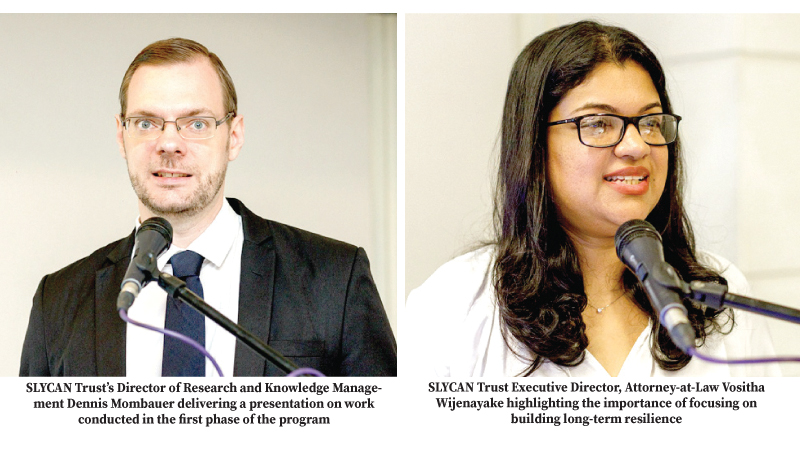As a climate-vulnerable developing country, managing climate and disaster risks as well as mobilising risk finance is a critical need for Sri Lanka.
SLYCAN Trust’s initiative of developing a Multi-Actor Partnership on Climate and Disaster Risk Management and Finance launched into a new phase on September 19 at the Cinnamon Grand Hotel, with the participation of key stakeholders from the agriculture, tourism, fashion, and SME sectors.
The key focus of the session was on collaborations, partnerships, and exchanges between different actors and stakeholder groups that could enhance opportunities related to accessing climate and disaster risk finance, strengthen mechanisms, harness synergies and increase mid- and long-term economic resilience.
SLYCAN Executive Director, Attorney-at-Law Vositha Wijenayake highlighted the importance of focusing on climate and disaster risk management for building long-term resilience.
“Climate change is a key factor that impacts today’s development. It is important that climate risks and impacts are considered and addressed in planning local and national level economic empowerment as well as resilience-building guided by inclusive and participatory processes,” she said.
Multi-actor partnerships
SLYCAN Trust Director of Research and Knowledge Management Dennis Mombauer explained the work conducted in the first phase of the program.

Participants from diverse sectors engaging in a discussion on climate resilience
“We have established this multi-actor partnership with a focus on Sri Lanka’s food systems to identify opportunities for enhancing and building on risk management and transfer mechanisms and accessing climate and risk finance.
“Moving into this new phase, we aim to formalise the partnership and expand it to additional sectors – tourism and trade, fashion and apparel – that are climate-vulnerable but also have the potential to empower entrepreneurs, communities and youth, and contribute to building overall resilience and prosperity,” he said.
As an output for the discussion on short- and medium-term goal setting for climate and disaster risk management, the stakeholders from the tourism sector identified the need for better risk mapping and risk transfer processes for the sector, including possible risk pooling through collective funding processes being set up. It was highlighted that it would be important to focus on the climate risks that are threatening the industry, while also identifying solutions through awareness and enhancing information sharing amongst key stakeholders in the industry.
The stakeholders representing the Small and Medium Enterprises (SME) sector highlighted the need to focus on the sector as a priority in the conversations on climate adaptability and capacity building.
The need for innovating the business models used by the SME sector to match global trends on sustainable innovation was identified as a tool to build resilience, while entrepreneurship skills development to adapt to climate change was recognised as a cross-cutting theme for all the sectors from national to local level.
Under the discussions on the food systems-related sector, the participants highlighted that research and development was a key aspect in scaling-up climate change adaptation action.
Among other points highlighted were Public-Private Partnerships; partnerships for knowledge and evidence sharing and scaling-up research related to the sector; and innovative technologies and technology transfer; and the importance of urgent measures for addressing climate-induced loss and damage in food systems. The participants also emphasised the need for climate risk management in aquaculture.
Stakeholder participation
Participants were representatives from the finance, banking, and insurance sectors, who contributed to the discussion in providing solutions and approaches to be generated in climate and disaster risk finance options for Sri Lanka. This included key stakeholders of agriculture, SME, tourism, and fashion and garment sector who represented Government ministries and departments, academia, private-owned businesses, and Government and private-owned finance and insurance sector organisations, as well as social entrepreneurs.







